FIFA WC 2018 - with mlr, jq and friends!!
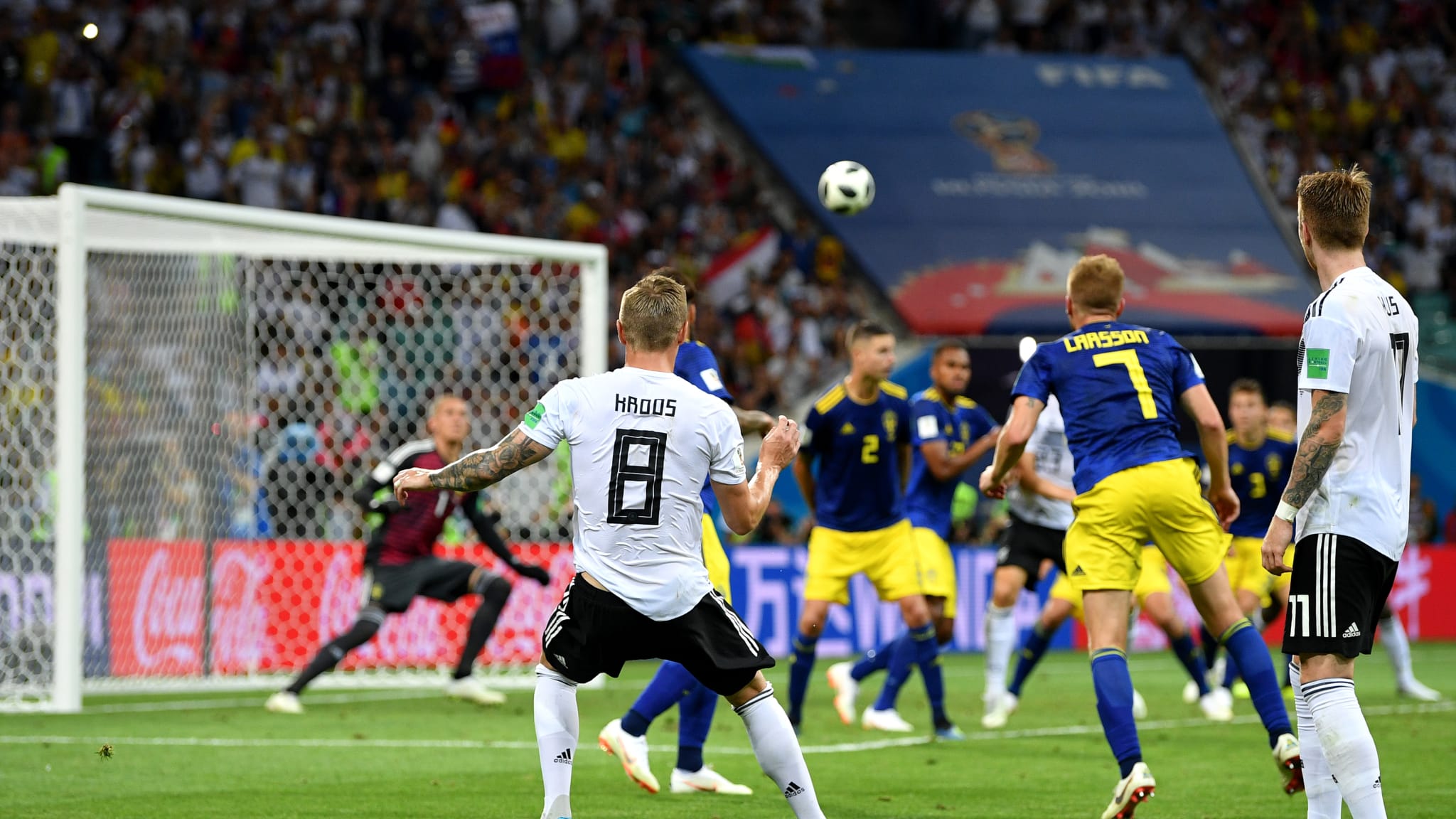
The group stage of FIFA World Cup 2018 ended yesterday with Belgium defeating England by a goal. What a tournament this is turning out to be, superb goals (Kroo’s banger was the best for me), not-so-predictable results, the Asians playing well (good luck Japan), extra time surprises and who can forget those VAR stories of penalties. Here is Nordin Amrabat showing some love for the technology.
This has also been a tournament with some of the best tweets I’ve read. Just have a look at this probability plot for possible Group F outcomes.
Cheat sheet for Group F possible outcomes!
— Joao Silva (@JPVSilva88) June 27, 2018
This is a complicated one, everyone is still in play and there is the possibility of three way ties.#WorldCup #dataviz @EightyFivePoint#MEXSWE #KORGER #MEX #SWE #KOR #GER pic.twitter.com/daQ5L0Mpzy
Follow @JPVSilva88, @jburnmurdoch, @StatsZone for such amazing updates and @8bitfootball for some 8 bit swag !!
I went on the exploration mode as well since the tournament started as the game is full of data points and you just need some curious minds to weave them together and come up with beautiful stories. Sometime back, I was introduced to a functional command line utility called miller by John Kerl. In short miller is like awk, sed, cut, join, and sort for name-indexed data such as CSV, TSV, and tabular JSON. I wanted to share and promote it as it has been a productive tool for me and what better opportunity than using it to explore the World Cup. You should definitely consider adding it to your data processing toolkit.
For this post, we’ll use such open source command line utilities like miller, jq (the json processor), some awk, sed (where I’m not yet skilled enough to use miller) and R (of-course) to analyse the tournament so far and let’s see if we can come up with something worth a share. For the data, we’ll be using the superb API from football-data.org. I’ll urge you to get your API key before proceeding further which can be obtained easily from this link. We’ll be registering for the free account as the data we get access to is somewhat sufficent for this post but you should definitely check out the full version as well. The team is doing an amazing job to get us the live updates as fast as possible. So let’s get started!!
The fixtures for the knock-outs have been finalised. So let us start by checking who’s playing whom
#KO fixtures
curl "http://api.football-data.org/v1/competitions/467/fixtures?timeFrameStart=2018-06-30&timeFrameEnd=2018-07-03" \
| jq '.fixtures[] | {htn:.homeTeamName, atn:.awayTeamName, date:.date, matchLink:._links.self[]}' \
| mlr --ijson --opprint --barred cat

Some mouth watering clashes there, high hopes for France vs Argentina, let’s have a look at there past world cup fixtures.
# Past clashes
curl "http://api.football-data.org/v1/fixtures/165119" | \
jq '.head2head.fixtures[] | {htn: .homeTeamName, atn: .awayTeamName, result:.result, date:.date}' | \
mlr --ijson --ocsv rename result:goalsHomeTeam,goalshometeam,result:goalsAwayTeam,goalsawayteam | \
mlr --icsv --ocsv put '$goalshometeam>$goalsawayteam {$result=$htn}; $goalshometeam<$goalsawayteam {$result=$atn}; $goalshometeam==$goalsawayteam {$result=drawn}' | \
mlr --icsv --opprint --barred cat

Two matches and Argentina winning both of them, though I feel France will be on the winnig side this time around.
Some football trivia courtesy OneFootball - On both these occasions, Argentina reached the final,loosing it in 1930 and winning it in 1978. The last South American team to beat France were Argentina in 1978, since then, France are unbeaten in 8 world cup fixtures against CONMEBOL opposition (W4, D4)
France as a team is studded with stars at all positions. But how has there journey been till now, let’s have a look at there Group Stage results.
# Group stage performance - France
curl "http://api.football-data.org/v1/competitions/467/fixtures" | \
jq '.fixtures[] | {homeTeamName: .homeTeamName, awayTeamName: .awayTeamName, resultHomeTeam: .result.goalsHomeTeam, resultAwayTeam:.result.goalsAwayTeam}' | \
mlr --ijson --ocsv filter '($homeTeamName == "France" || $awayTeamName == "France") && ($resultHomeTeam != "")' |
mlr --icsv --opprint --barred cat

France won both there matches against a weaker opposition, but drew with Denmark. They’ll definitely have to play better than that to beat Argentina.
Instead of querying the API for every team, let us prepare a temporary dataset with all teams and filter as per our needs
# Preparing the result dataset for the group stages
curl "http://api.football-data.org/v1/competitions/467/fixtures" | \
jq '.fixtures[] | {htn: .homeTeamName, atn: .awayTeamName, rht: .result.goalsHomeTeam, rat:.result.goalsAwayTeam}' | \
mlr --ijson --ocsv cut -f atn,rht,rat | \
mlr --icsv --ocsv rename atn,team,rht,ga,rat,gs > /tmp/results_all_teams.csv && cat results_wc.csv | \
mlr --icsv --ocsv cut -f htn,rht,rat | \
mlr --icsv --ocsv rename htn,team,rht,gs,rat,ga > /tmp/home_scores.csv && awk 'BEGIN {FS="," ; OFS = ","}; {print $1,$3,$2}' /tmp/home_scores.csv > /tmp/home_scores_mod.csv && sed 1d /tmp/home_scores_mod.csv >> /tmp/results_all_teams.csv
Now let’s have a look at the top goal scoring teams in the group stage.
#Goal For and Goals against
cat /tmp/results_all_teams.csv | \
mlr --icsv --ocsv filter '$team != "" && $gs >= 0' | \
mlr --icsv --opprint --barred stats1 -a sum -f gs,ga -g team then sort -nr gs_sum
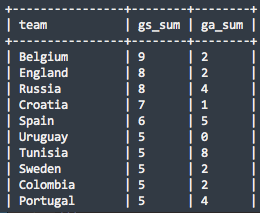
Wooh !! Belgium tops the charts with 9 goals, closely followed by England and Russia with 8 goals each.
France and Argentina scored 3 goals each, though Argentina conceeded 5 while France only let 1 goal in. This can be a deciding factor between the two teams.
Now, let’s move on to my favorite part of this analysis, the Players themselves. For this, we will write a small R script to fetch data for all players participating in this competition.
library(tidyverse)
library(httr)
team_page <- "http://api.football-data.org/v1/competitions/467/teams"
all_teams <- team_page %>% httr::GET() %>% httr::content()
player_links <- lapply(lapply(lapply(all_teams$teams,'[[','_links'),'[[','players'),'[[','href')
all_player_info <- lapply(player_links, GET)
all_player_info <- lapply(all_player_info,content)
write(jsonlite::toJSON(all_player_info,auto_unbox = TRUE),"/tmp/all_players.json")
We will need a players name, position and date of birth. Let’s fetch these details from the json
cat /tmp/all_players.json | \
jq '.[].players[] | {name:.name,position:.position,dateOfBirth:.dateOfBirth}' | \
mlr --ijson --ocsv cat > /tmp/all_players.csv
Kylian Mbappé was declared the youngest goal scorer for France at World Cup Finals. He’s definitely not alone as there are a lot of youngsters participating in world cup. Let’s look at the top 10 youngest players.
Note: Some players were a part of there larger WC squads but not of the last 23, so there can be some discrepancies in the API.
cat /tmp/all_players.csv | \
mlr --icsv --ocsv put '$age=(systime()-strptime($dateOfBirth,"%Y-%m-%d"))/(365*24*3600)' | \
mlr --icsv --ocsv sort -nf age | \
mlr --icsv --opprint --barred head -n 10
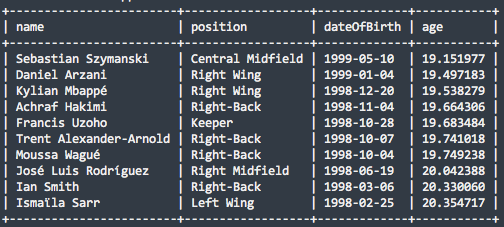
Since, the API provides the position labels as well, lets look at some position level statistics
cat /tmp/all_players.csv | \
mlr --icsv --ocsv put '$age=(systime()-strptime($dateOfBirth,"%Y-%m-%d"))/(365*24*3600)' | \
mlr --icsv --ocsv --barred sort -nr age | \
mlr --icsv --opprint --barred stats1 -a min,max,mean -f age -g position
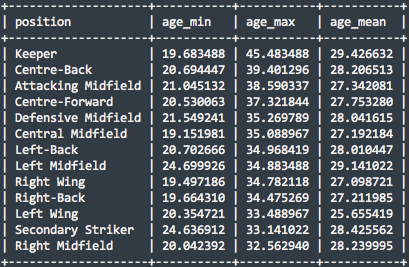
Looks like teams trust experience goalies at the tournament, average age of a keeper is ~30 years. Left wing is an attacking position (Sadio Mane for Liverpool), most players here are ~25 years of age
How can we not use a ggplot with such a beautiful dataset. What if we can plot the youngest and the oldest players at every potion and look at the results on top of a rectangular field (the same way team roasters are presented live on televisions).
We wrote a small script for this task, it takes two parameters, player data (name, age, position, country) and the type ([y]oung/[o]ld) and then plots a field with names and respective country flags. Lets look at the results.
Team Agile 11
./getPositionStats.R /tmp/all_players_age.csv y
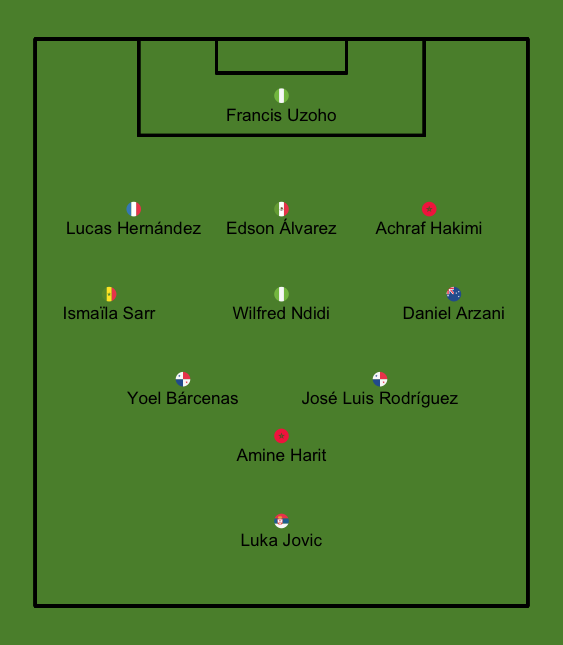
Yes, i know, Kylian Mbappé is not part of the youngest team, API tags him as a right winger and there are players younger than him at that position. Not my fault fellas!!
Team Wisdom 11
./getPositionStats.R /tmp/all_players_age.csv y
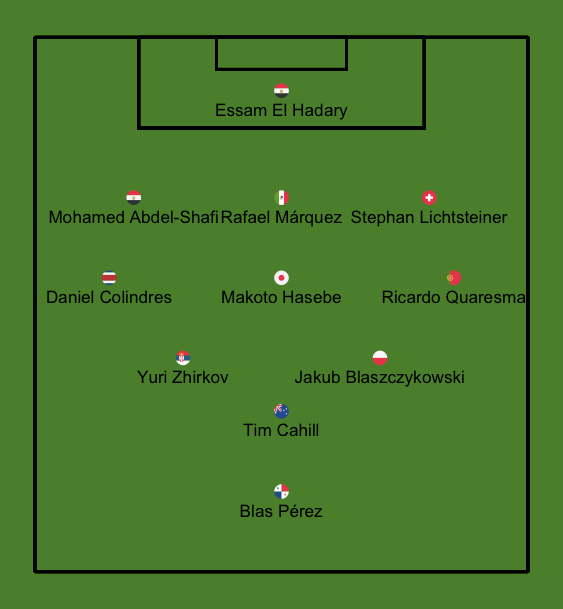
And here’s our tribute to the oldest player participating in this WC!!
Missed Penalty
— RTÉ Soccer (@RTEsoccer) June 25, 2018
41mins #KSA 0-1 #EGY
Fahad Al-Muwallad's penalty is spectacularly saved by the oldest man ever to play in the World Cup, Essam El Hadary.#RTEsoccer
Watch live: https://t.co/wJ3pY1F41H pic.twitter.com/JdSUb3vdyS
We are almost towards the end, let’s end our exploration by checking if I share my birthday with some WC players participating in 2018.
cat /tmp/all_players.csv | \
mlr --icsv --ocsv put '$age=(systime()-strptime($dateOfBirth,"%Y-%m-%d"))/(365*24*3600)' | \
mlr --icsv --opprint --barred filter '$dateOfBirth == "1991-04-07"'
And yes!! The Serbian and Crystal Palace Midfielder ..

Thanks for reading :)
I learnt a lot of things writing this and I hope you will too.
I could have not written this with the help of such brilliant open source tools. I thank and appreciate there creators and the community behind it and hope we can support it in whatever ways we can. The documentation of these tools is brilliant and can be accessed here and here.
Enjoy the World Cup guys, Bring on the Knock Outs!!